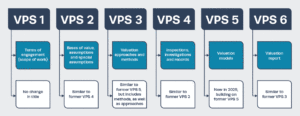A ll RICS APC candidates undertaking valuation and/or loan security valuation as technical competencies need to have a robust understanding of the Red Book. You need to know all about the Red Book at level 1, apply the Red Book Global to your valuation work at level 2 and advise clients through Red Book-compliant valuations at level 3.
The Red Book Global applies to all valuation work globally, although some jurisdictions will have their own valuation guidance, which should be read alongside the Red Book Global. For example, in the UK there is the UK National Supplement – which you also need to read for any valuation work undertaken in the UK. Other countries with jurisdictional guidance include Dubai, Germany, Italy, Netherlands, New Zealand and Singapore.
The latest edition of the Red Book Global took effect from 31 January 2025. There is no excuse for not being aware of the changes or applying them in valuation work you undertake for clients.
So why did the RICS make recent changes to the Red Book?
• To simplify and clarify guidance for valuers
• To reflect the changes to the latest version of International Valuation Standards
• To incorporate changes from the RICS Valuation Review
• To future proof valuation practice, eg updates relating to technology and ESG
• To help valuers to provide the highest standard of service
• To build public trust in valuations provided by RICS registered valuers
The new Red Book includes key changes to the structure of the Valuation Technical and Performance Standards and the Valuation Practice Guidance Applications. The VPS contain both mandatory and advisory (best practice) guidance.
It is recommended that you review the VPGAs relevant to your area of valuation practice, as there are 11 of them. They are generally advisory in nature, advising on best practice.
A key new VPGA is VPGA 11 – Relationship with auditors, while VPGA 1 – Valuations for financial reporting has been rewritten. This includes reference to key International Financial Reporting Standards, including IFRS 13 (Fair Value), IFRS 16 (leases) and IFRS S1 and S2 (sustainability and climate disclosures).
20-minute challenge
Read VPS 1 of the Red Book Global 2025. Select five of the minimum elements of a VPS 1 compliant set of terms of engagement and write a short paragraph for each demonstrating your understanding of them. You can check your answers by reference to: https://www.rics.org/content/dam/ricsglobal/documents/standards/Terms_Of_Engagement_Framework_2025.pdf
The quick quiz
1. When was the UK National Supplement last updated?
• 2020
• 2021
• 2023
2. When did the changes in the latest UK National Supplement take effect from?
• 1 January 2022
• 1 January 2024
• 1 May 2024
3. Which of these countries does not have a jurisdictional National Supplement?
• Finland
• India
• Poland
Answers below
The RICS Valuation Review
The RICS standards and regulation board commissioned the RICS Valuation Review to future-proof the valuation of assets for investment purposes as a result of market changes, the impact of Covid-19 and structural shifts in occupier and investor demand.
• The review was led by Peter Pereira Gray and supported by an expert advisory group.
• The review focused on the valuation of property assets for investment purposes, particularly where these are relied on by third parties. These are typically higher-risk valuations where public confidence must be at its highest.
• The review made 13 core recommendations, three of which carry the greatest weight:
• The creation of a dedicated, independently led valuation regulatory quality assurance panel, under the jurisdiction of the RICS SRB.
• The creation of a formal valuation compliance officer role within regulated valuation providers to ensure services are delivered appropriately, objectively and to the standards observed across today’s financial services industry. This role is envisioned to provide a robust foundation for full accountability and responsibility of valuation firms to their clients and to the valuation regulatory quality assurance panel, particularly where multidisciplinary services are provided to clients.
• The need for further specific RICS guidance to clarify RICS’ expectations around the culture and behaviours expected of RICS professionals in the pursuance of valuation activities.
The review also promoted the adoption of the discounted cashflow methodology by valuers over the traditional investment method. This is because clients are increasingly requiring explicit valuation advice, with specific inputs and assumptions adopted (rather than all being reflected in an all-risks yield, which is growth implicit). These inputs and assumptions include rental growth, risk premium, discount rate, timings and exit point.
Further reading and resources:
• Red Book Global – https://www.rics.org/profession-standards/rics-standards-and-guidance/sector-standards/valuation-standards/red-book/red-book-global
• UK National Supplement – https://www.rics.org/profession-standards/rics-standards-and-guidance/sector-standards/valuation-standards/red-book/red-book-uk
• RICS Valuation Review – https://www.rics.org/profession-standards/rics-standards-and-guidance/sector-standards/valuation-standards/valuation-governance












